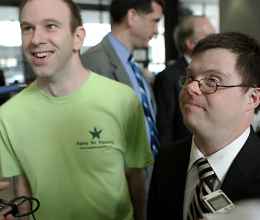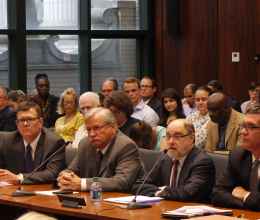
July 8, 2009 - Yesterday, a federal district court issued an order decertifying the class in Ligas v. Maram, a lawsuit seeking to provide individuals with developmental disabilities in Illinois the opportunity to live in the community. The following statement can be attributed to class counsel that brought the litigation:
Yesterday's ruling by the court is a disappointing development, but does not change the basic facts. Illinois remains dead last of all the states (and the District of Columbia) in serving people with developmental disabilities in small community settings. This shameful record still requires systemic reform. The case has not been dismissed and the court must still determine whether Illinois is in compliance with the law.
Our plaintiffs, including Stanley Ligas, and thousands of others in Illinois, want the option to live outside of an institution, to make their own choices about where to live, whom to live with, what to eat and when to eat, and even what to watch on television. The Supreme Court of the United States ruled ten years ago - in Olmstead v. L.C. - that people with disabilities have a civil right under the Americans with Disabilities Act to make these choices. These civil rights must be granted by Illinois. We are not deterred by this temporary setback. Instead, we are redoubling our efforts to ensure that everyone in our state is able to make critical choices about their lives. We are committed to working vigorously on a variety of fronts to reform the regressive system in Illinois. This outdated system does not serve our friends, neighbors, family members and colleagues with developmental disabilities. The struggle to enforce their civil rights did not end with this ruling.
We thank the families and individuals who support this litigation in hopes of creating more community-based living options in Illinois. The determination and dignity of these individuals underscores the critical nature of this reform. We look forward to the day when Illinois ends unnecessary institutionalization and begins to serve all persons with disabilities.



